#like women is not even always in niqab especially with other women they usually in normal clothes
Explore tagged Tumblr posts
Text
İt's funny how sexualised dust ist. And how she is always pretty and sexy like yeah she is etc. But she is in modesty. She wears an niqab. Whole point is being modest and not attractive.
Like even with hijab you always need to be careful like your tunic is not too short or your curves are not so recognisable , your things are not too tight and she is drawn always like body latex suit but add skirt.
I even saw someone say to her her niqab makes her mysterious and sexy like this is so???
#like seeing niqab sexualised is so weird and and weird#like niqab isnt sexy this is the whole point#and like people still wear things under niqab#like women is not even always in niqab especially with other women they usually in normal clothes#my family were always like most boring looking people with niqab intentionally then they take pff niqab#bam all of them overdressed like they are going to wedding gorgeous with makeup and everything#and sometimes people wear only one part of it#i meam sooraya is afghan amdnthey can have different kind of culture when its come to it of course#but i domt know i know many afghan friends and they are also pretty same?#anyways her niqab being just skin suit but with skirt is annoying#like she can be sexy and beautiful but generally niqabi women only do this for themselves not for outside so its hidden#sooraya qadir#her continuing of her religion and not giving her religious duties but also still be part of X-Men is my fave thing about her#like i am not muslim anymore bit this still means a lot to me she is being awsome and still part of marvels of marvel#and when they literally let her give up her values this just lost all meaning?#also realm of x explain extremely important question next issue how can she find the kabaa in vanaheim?????? /j
16 notes
·
View notes
Note
Hey, I think I sent in ask by accident. It said have you seen lady parts, but there was more I was going to say, apologies! This is what I meant to say.
I am not Muslim so I really hope I am not overstepping but about your post about wanting representation for hijabi women that isn’t questioning her faith, We Are Lady Parts is a British about an all Muslim punk rock band - two of the members are hijabi and the band manager wears a niqab but I don’t think their actors do.
This is a quote from the creator, Nida Manzoor “I was slightly frustrated with the kinds of representation I've been seeing, especially with Muslim women as being oppressed, as being these victims, and I wanted to show them like I knew them, with all the joy and warmth and silliness”
hello !! it’s ok ur not overstepping !! but i have not seen this—although if you say it’s good representation i will look into it bc i rly would like to see something with rep that doesn’t make me want to fold into myself 🥲 so ty for telling me ab it <3 i definitely agree w the creator on the fact that muslim women are often portrayed as oppressed or even just seen that way outside of media rep too and it’s simply not the case—which even if there are clear instances where you see oppressed women who are muslim, it’s always a result of culture not religion. culture can be very toxic, i know mine is, and a lot of the views ppl have are often misogynistic but it has nothing to do with religion. a lot of the misconceptions ppl have ab islam are almost always a culture vs religion thing that they didn’t bother to look more into. which is a bit frustrating bc if u just look into islam a bit, as in read the guidelines and the values—doesn’t matter if you practice or not—you’ll see it gives women a ton of rights. a lot of it also doesn’t have to necessarily do with the cultures of muslim ppl specifically—some of it also just what western culture and the media has adopted. like for example people always ask me if i “was free to make the decision” would i show my skin instead of dress modestly. which is honestly a rather rude way of asking if i wish i could dress less modestly from time to time because it is my choice to dress this way, and women’s rights are not directly correlated with how much skin they show. a women who does not show her skin is not automatically oppressed—but in a way social media conditions a lot of ppl to think that way bc feminism has more or less been heavily pushed as this concept of wearing clothes as revealing as u like bc it’s ur body. which is true, you are well within ur rights to dress revealing if that’s ur choice—but the opposite also holds true where wearing clothes as modest as u like is ur choice as a woman and choosing not to show skin is not a sign of oppression
anywayyyyy ramble aside bc i could go on about this all day fjsjfjshf at the end of the day it stems mainly from like white savior complexes where white ppl just feel the need to a) not understand minorities and their values and traditions but also b) feel the need to erase them and portray them as wrong in order to “save” them. like 9 times out of 10 the muslim girl is written to take off her hijab and the white people are the ones that influenced her to do that and it makes her “happier.” i speak for myself and for a LOT of other hijabis when i say the best thing a white person could do is stop making a scarf on someone’s head seem like an abnormal concept and leave them alone—that’s the realest way they’ll be “happier” bc usually we just mind our business until they come along. i promise we don’t sit and stare longingly at their hair like “if only :(“ 😭
1 note
·
View note
Note
hey :3
could i get a matchup with one of the Gorillaz members? (preferably romantic) idrc about gender but i have a slight preference for women, and i myself am agender.
so for hobbies i draw/paint mostly but i also play guitar, read, cook and collect a lot of random stuff (like porcelain dolls, bottle caps, books, guitar picks, etc) so consequently my room is kinda cluttered 24/7 and even when i clean it its just always a mess lmao. Despite that in every other aspect I am very organized and can’t stand to see a place messy so I’ll randomly clean a lot (especially if I’m upset over something.) i love horror movies of all types, especially the older ones with terrible special effects. my love language is a mix between physical touch and acts of service, tho i get kinda disturbed whenever someone randomly hugs/touches me without a warning, i’m very jumpy.
Appearance wise i’m 5’5 with jet black hair (tho naturally i’m blonde) with cool grey eyes and tan skin, i’m supposed to wear glasses but I forget all the time; my eyesight is terrible and I often have to ask people to read something off to me.
usually i dress gothic but if im feeling lazy i’ll look more ,grundge’. I like to wear a lot of accessories and I do my make up every day if I have time, and i wear a niqab or a hijab most of the time, though I am a Buddhist (not a very good one, but i try.)
for personality i usually try and just keep quiet but i have problems with my temper, i have gotten physical with people at some points. mix that with not being able to read tone at all/being blunt and having a rbf most people dislike me off the bat or are slightly intimidated. When i get to know someone, however, i am very loud and enjoy messing around with my friends. My sense of humor is wildly childish lol. i have issues talking directly about my problems so usually I just joke about them and if anyone seriously asks about it I brush it off. I try to befriend most everyone cuz i feel terrible about how I come off to most people but I only have like 2 close friends.
anyways i hope you’re doing okay!! :]
Noodle!
She's there as a sort of calming source for you. When you get a little temperamental, she's there to soothe you and remind you that you can do better.
Though sometimes she can see why you're upset, it upsets her too and then she joins in on the fights akjdfladfkj
Whenever she goes on tour she always brings back a guitar pick for your collection!
#noodle#noodle gorillaz#noodle x reader#matchups#gorillaz matchups#gorillaz x reader#gorillaz#matchup monday
6 notes
·
View notes
Photo
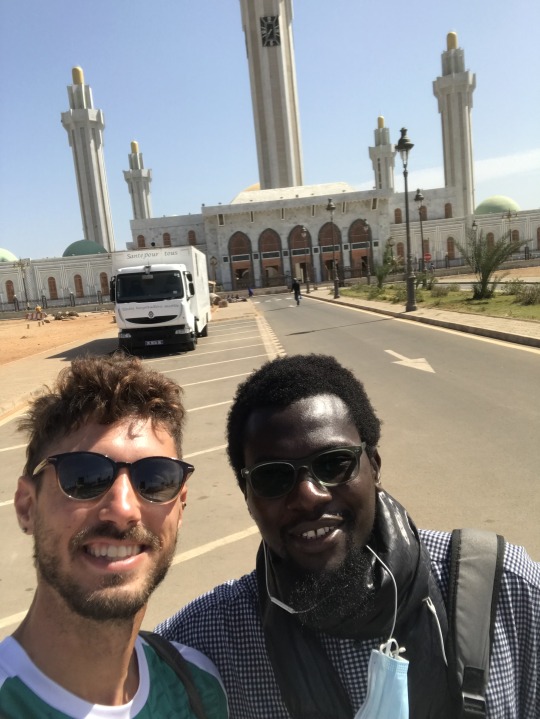
Religion in Senegal
Having just moved here from Egypt, the ways Islam showed up in daily life here were wildly different. There, to my American eyes the biggest difference was in the separate spheres men and women occupied in public space, the care around every male-female interaction, the headscarves hijabs and full covering niqabs. Here, men and women mingled much more freely. They also showed much more upper body skin, though long skirts and pants were the norm away from the beach.
Especially in the north half of the country here, almost everyone is Muslim, though there are some Christians here and there. On Fridays lots of people -even the children- dress up in their “Sunday best” to go to the mosque for the afternoon sermon, prayer mats slung over shoulders. It’s the men who go, as a rule, though there’s a room in each of the larger mosques for women to pray as well. The call to prayer echoes out five times a day, with imans of varying singing abilities booming over the speakers.
The Sufi sect of Islam is popular here, and singing circles pop up almost every night. The keening melodies repeat, often one line from the Quran. It’ s a sound that I think will always root me in that time and place, and reminds me of the Hebrew niguns I love chanting with my own spiritual group.
Islam also exists alongside -or maybe superimposed on- local beliefs that have existed since the religion reached West Africa 1,000 years ago. Even in the time of the Malian king Mansa Masa’s pilgrimage to Mecca in the 1300’s, elites balanced a profitable foreign religion with existing systems. Tradition medicine, paying for blessings -or curses- from the seurigne elders is still very much a part of life here, though it seems to happen less openly than Islamic practices. There’s also the Baye Fall, a subject of one of the Sufi brotherhoods and followers of Ibrahima Fall (himself a follower of Chiekh Amadou Bamba). They wear white and black checkered robes and often rainbow patchworks, a louder, higher pitched chanting and gourds to collect donations. The small communities from other parts of Senegal exist sometimes uneasily here in the Lebou village, unlinked by the usual family ties.
Systems of Islamic and Quranic schools also exist alongside the public system of French or French & Arabic schools. Students clutching wooden tablets with carved verses are common all over the city, though teacher salaries are controversially funded by young pupils asking for change on the street. There are movements to stop students from panhandling every so often, but the national population is so young it seems like the government feels any system that can look after a portion of the youth can fund itself however it needs to.
Many people here have described Islam to me -especially in conversations about my Jewish heritage- as a religion of peace. Fundamentally, Judaism and Islam seem more like legal frameworks that a culture has sprung up around, though I identify more with the cultural pieces than doctrine. That said, the way Islam is practiced by more of the Senegalese I know offers deep kinship and ritual throughout the day.
5 notes
·
View notes
Text
I don't want to do this!:
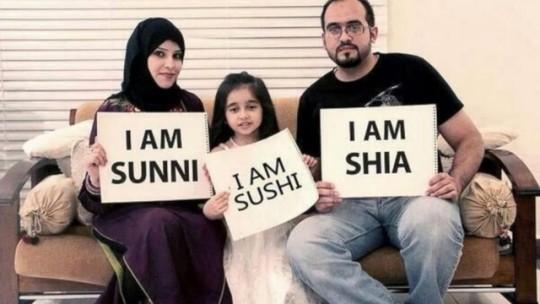
I absolutely hate writing about religious discrimination!
Frankly, I wish that I wasn't putting fingers to keyboard about any discrimination.
I also desperately don't want the focus to be on discrimination against everything Islamic and Muslim.
However, sadly, it's the most venomous hated that I have ever encountered, second only to racism against the black human beings of our world.
All my life I must have lived under a rock, maybe I live under a rock now, yet the vileness and outright lies that come out of those obsessed with hating all Islam and Muslims, plus anyone who stands up and says this is wrong, is obscene.
I am disgusted in the way these people respond.
I have had differing opinions with both Muslim men are women yet been addressed with respect and politeness. They are peaceful and not intimidating in any way.
Speak to a person who is anti Muslim, they refuse to listen to anything that may contradict what they want to believe, they will call you a liar and slander you. They intimidate and bully, call you names, question your mental stability, stalk your FB and target your children. The insults and illogical reasoning is unbelievable.
I am horrified that there are people like this in the world!
More horrifying still is for once I can see the appeal in hating the West.
Imagine a young Muslim man, born here, and rather then allowing him to explain what his religion means to him, to try and teach people, that hate everything about him, that he deserves to be not discriminated against, he gets told what his religion is, he is called a murder, a terrorist, a paedophile, a Mysoginist, etc. His sister is spoken to about her husband beating her, being oppressed, asked if she still has her clitorus, threatened with physical abuse, has her hijab torn off, threatened with rape, told she is a bad mother because she sells her baby girls to be raped by old men.
And no matter what they say to try and explain their actual beliefs the abuse flows. And this is from their own countrymen.
Mate, I would want them all gone too! Be honest, who wouldn't!?
Yet if they report abuse or complain about their treatment they are accused of wanting to change things. "They come here and try to change everything", is the cry from the haters!
1) There is NO law that insists that ALL women wear a Burqa in Saudi Arabia: Hijab is only compulsory for Muslim women. Anything else is a choice for those in a practicing Muslim family.
2) Women are not allowed to get an education in Saudi Arabia: I urge you to look up any TV broadcast from local Saudi Arabia telecasts. Women, in hijab, reading the news. This suggests an education. However, both men and women are encouraged to gain knowledge in Islam.
3) WTF does Saudi Arabia have to do with every other Muslim world wide, especially in Australia?
4) FGM (female genital mutilation) is an Islamic practice: Far from it! The Islamic religion urges that both men and women enjoy sex and that a man sexually pleases his wife. FGM is a tribal practice. However, MGM (male genital mutilation) has and still is widely practiced in Australia.
5) There is NO "no go" zones in Australia!: This urban myth was started by a female, Canadian Islamphobe. It was said to be proved when the police removed her from Lakemba for disturbing the peace. The police weren't working for the Muslims to enforce their "no go" zones! How ridiculous. Others tell totally unbelievable stories about women walking there and being spat on for not wearing hijab. Firstly, not all Muslimah wear hijab, even in Lakemba. Also there are numerous non-Muslims that go to these fabled areas to eat, visit, shop, do business, etc. This rumor is absolutely ludicrous!
6) Muslim women are oppressed, even here in Australia!: It is naive that there is no abusive people in any religion or walk of life, however, Muslimah are not oppressed as perf the usual course. Quiet the opposite! Historically, and as it is today, Muslimah have the freedom to do and be whatever they want, just like Muslim men. There is no distinction between what male and females can do. In fact, men are encouraged to wash their own clothes, cook and do housework. Also the Qur'an makes it very clear that the mother is the head of the household.
7) It is always claimed that Muslims want to change things: Yet, the question, "what have they actually changed?", goes unanswered. Muslims are required to live by the laws of the land, and as such, really don't want to change anything but the way they are treated. Especially how the women are treated. Our hero Islamphobes always target women and children because Muslimah are more recognizable.
8) Why are these people so threatened by the hijab or niqab?: For fuck sake it's a piece of material! It's not what's on a woman's head that oppresses her. However, who are those that want to oppress Muslimah? Muslim men or the Islamphobe? I say without hesitation, the Islamphobe! They don't ask a Muslim women how she feels, they don't ask what she may want to wear. They rarely comprehend the meaning of the hijab to a woman but rather try to twist it into some sexually perverse. They proclaim that Muslim women shouldn't wear a head covering. As Australia is a free country, with a freedom of religion and freedom of lawful individually, the real oppression and discrimination, is telling Muslim women what to wear.
9) Telling Muslim women what they are: The idea that, to Islamphobes, Muslim women are stupid and therefore, don't know that they are oppressed, would have to be the most Mysoginist slap in the face ever! All I can say is, "at least Muslim men know a woman's worth is awesome".
10) Muslim men marry girl babies of 5 to 6 years old and Muslim mothers allow it: Firstly, American is the place booming in child brides at the moment. With some states having no minimum age for marriage and also no divorce for women. Compared to Malaysian Clerics, years ago, raising the age of concent to 18. Also contrary to European/western/Christian culture, women have been granted divorce since the 700s in Islam.
11) Women wear the Burqa in Australia: This is actually one of those urban myths, started by Pauline Hanson. To see a Burqa in Australia would be very unusual. Most Australian Muslimah are from cultures that don't don the Burqa. The Burqa is an Afghan tradition and is very rare in Australia. Then why fight "ban the Burqa"? In one word, principle! It is against a woman's basic rights to tell her how much she can or can't wear, within the laws of public decency. There is also a security argument, as a Burqa is rarely worn that argument is rather moot.
12) Muslim men have lots of wives and children and just live on welfare: This is so silly that it's laughable. Once again, it is rare for Muslim men to have more than one wife these days as it is financially impractical. Also most Muslim men prefer one wife. In Australia, on average, the Muslim family consists of 2 children. With all this being said, usually Muslim men and women are educated and professional people. If not they strive to own businesses. The stupid welfare claims are unfounded and actually go against most Muslim traditions and cultures that have a hard work ethic.
13) They come here are get more welfare than Australians with no waiting period: This information can be researched on government websites. There is a waiting time for new Australians, Muslim or otherwise, which often means charitable families that sponsor them and take them in during this time. When they do receive any benefit, before getting on their feet, it is no more or less than anyone else.
14) They receive a thousand dollar iPhone and designer clothes as soon as they arrive: Is this one even worth answering? I just shake my head in disbelief!
15) Muslims have been Australians for generations: It amazes me how many people actually believe that no Muslim is Australian born. The history of the Islamic people in Australia predates white colonization. Islamic men from Indonesia travelled down and through Australia. There was intermarriage with the Indigenous peoples and even revertion to Islam by some. A more constant move to Australia, by those of the Islamic faith, started in the 1800's.
16) All Muslims are the same because they read from the same book: this is like saying that all Christian denominations are the same because they read from the same book. Most know that this is not the case.
There are many different varieties of Muslim. Yes they have the Qur'an yet addition books vary between the sects.
There are 72 different sects, numerous sects within the main sects, different traditions, different cultures, different regions, different regions, different countries and different families.

As for the Qur'an: there is the subject context, further context, overall context, historical context and spiritual context. Then all the different ways it is interpreted. Also interpretation can be manipulated and cherry picked to suit an agenda or bias. This can be said of the Bible also.
Where interpretation is important is in the understanding of Arabic. To translate a language as complex as Arabic into simple English leaves the meaning truly lacking.
For example: Islam is a very sexually moral religion. Men and women are not meant to sexulise each other, There is no unsupervised dating and dressing is modest. However, it is commonly thought the men will receive a bus load of virgins to have an orgy with in paradise. However, "virgin" more correctly translates to "pure". This is a "spiritual" context and "heavenly beings/angels is probably a better translation into English.
17) Muslims want to kill all Jews and Muslims. The Qur'an tells them to kill all Christians: Unfortunately people are so off the mark on this one. Islam actually says that Muslims cannot destroy a place of worship nor hurt religious "ministers". The Qur'an refers to Christians and Jews as the "people of the book". In fact, the only other women a Muslim man is permitted to marry is either a Christian or a Jew. The wives of these two religions are also not expect to revert as they are seen as sisters to Islam. Christian and Jewish men and women are thought of as brothers and sisters to Muslims.
There is a long list of urban myth, propaganda, rumors and out right lies that are used as ammunition against Islam and Muslims.
The arrogance of the Islamphobe is to tell a Muslim what their faith is! With no other religion would a person, outside that faith, verse another in their religion.
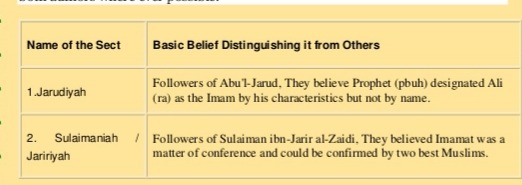






#discrimination#islamophobia#islam#women#womens rights#muslims#cultures#veil#head scarf#hijab#religion#islamic#truth#freedom of choice#freedom of religion#muslimah#sexism#arrogance#ignorance#propaganda#myths#abuse#rude#uneducated
133 notes
·
View notes
Text
Skam — the Norwegian Drama that made be even more open-minded.
Skam — the Norwegian Drama that made be even more open-minded.

“Islam says what it always say. That all the people in this world are equal and that no person should be talked about behind their back, violated, judged or ridiculed. So if you hear anybody use religion to legitimise their hate, then don’t listen to them. Because hate does not come from religion, it comes from fear.” — Sana Bakkoush to Isak Valtersen
This. This drama is simply one of a kind. And I absolutely loved it. All 4 seasons. And every one of its’ episode. This drama was filmed in Norway and was only well-knowed in the Nordic countries until season 3, where it exploded into the international stage. For such a drama intended to young viewers, it has very deep contents which revolves around: identity, feminism, rape, belonging, self-confidence, homosexuality, mental illness, the Islamic religion, cyber-bullying, and forbidden love — all in 4 seasons of approximately 10–11 episodes each. As a teenager myself, I can relate so much to the main characters in all of the seasons. Literally.
Disclaimer: Possible spoilers ahead!

The 1st season revolves around Eva. And I have to admit that I didn’t really like her character. She was way too indecisive, controlling, insecure, and lonely. Additionally, she was a bit more slutty (yes) in the future seasons, which made me dislike her quite a bit. But, I realized. That…that I carry all of those qualities, too (except for the slutty part, no). She was easily the one I empathized with the most out of all the main characters. Eva was the epitome of a teenager. Her parents are usually not there with her, and when they are, there usually are events that causes misunderstandings between her and them. Her friends, well her old friends weren’t there anymore. She chosed her loved guy over her friends, which her friends dumped her for because they also liked him. They weren’t understanding to her. But the guy chose her, not them. She was then alone, then and there.
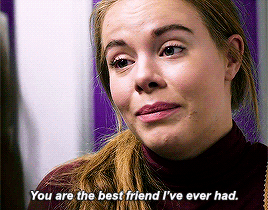
Fortunately for her, she found friends soon enough. Real friends. Friends that helped her know who she really is. Friends that helped her during her times of trouble. And friends, that she, too, will help in the future. In her season, I saw many events that were caused by two reasons.
Lack of communication. Lack of trust.

I learned that communication is vital. Whether it be to your friends, families, or your partner. You shouldn’t hide something. You should always ask when you doubt something. And most of all, you should trust your loved ones. And ask your loved ones to trust you, too. Trust is vital. And the world would be damned, if people would have absolutely no trust to other people.
“What is this bullshit about ‘what kind of person’ I am? Maybe I’m someone who gives up?! I don’t know! Why would I know what kind of person I am? Everyone is like, “What kind of person are you? You need to know who you are!” What a fucking cliche!”
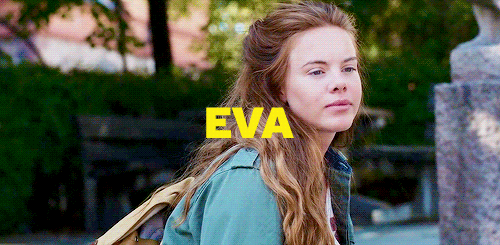

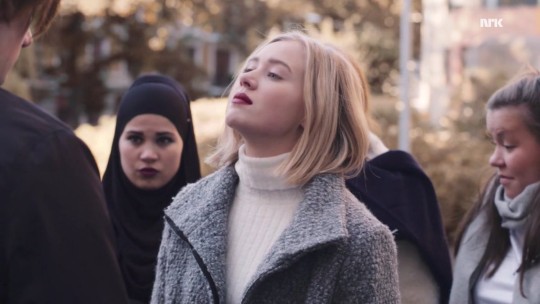
Season 2 comes with the feminist, social justice warrior, individualist, and progressive: Noora. She is by far, my most favorite character in the series. As a feminist, individualist, and fellow progressive, I view her as my political sister. She also has the best quotes (on par with Sana, in my opinion) in the series. And the burns, oh dear. Just look at this:
https://www.youtube.com/watch?v=nfnMnkRk9Ek
Don’t mess with Noora. Ever. But that’s just a façade. Only in the outside is she really cold. In the inside, she is very soft, insecure, brash, lonely, and irrational. Much like Eva, except she doesn’t show it. This becomes self-evident once she starts crushing on William. Eventually she accepts his love. And they turn out to be right for each other. But not without problems. This series has arguably the heaviest crime out of all the other series. Rape. Or rather, the thought of having been sexually violated. Even worse, the thought of having been sexually violated by her lover’s brother.
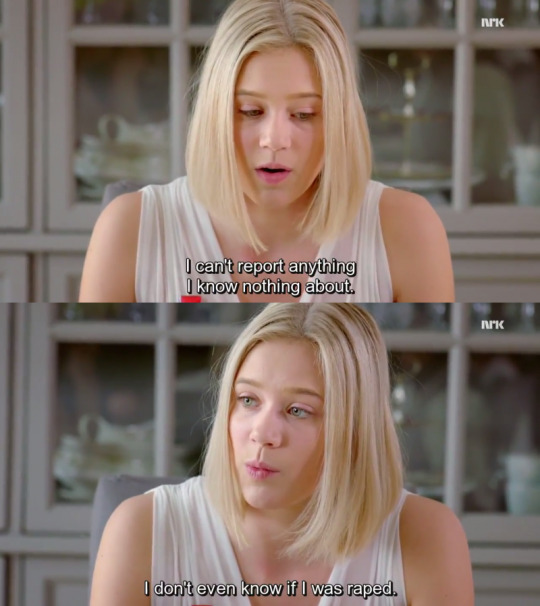

The most impressive thing about it is how she handled it. And how she trusted her friends to tell it to them, and how they helped her overcome it. In the end she wasn’t really sexually assaulted. And she also absolutely destroyed William’s brother. AND IF YOU HAVEN’T SEEN THE ENCOUNTER YET, YOU WOULD SO LOVE THE REACTION ON HIS FACE. Totally.

“People experience horrible things everyday, and they still manage to be nice to others. Being an asshole is not something you’re born with, or something you become. It’s a choice.” — Noora to William
“Girls who call other girls slut have 90% more chance to get Chlamydia.” — Noora to Emma
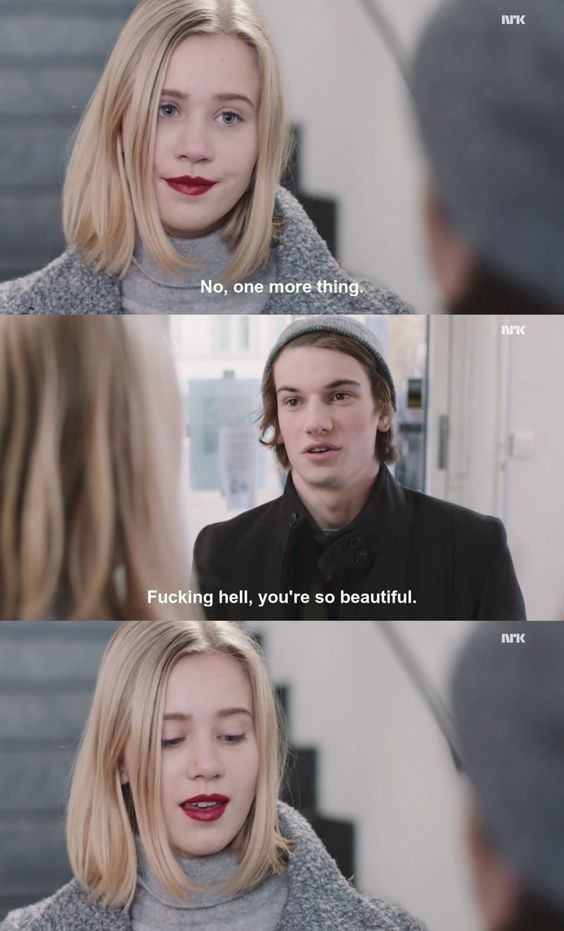
“It’s interesting that you who describe yourself as a feminist, is calling others ‘slutty’. Chris doesn’t have that reputation because guys don’t go around calling other guys ‘sluts’. So if you think it’s unfair, you have to stop calling girls ‘sluts’.” — Noora to Vilde
“I don’t even know your name.” — Noora
“Call me what you want.” — William
“Yeah, but then…Then I choose to call you ‘asshole’.” — Noora to William
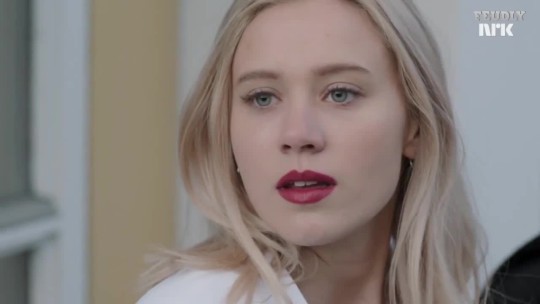
She also supported Sana in season 4 with Yousef a.k.a second best couple (next one is the best couple, for me anyways) and was literally fangirling over them. She’s definitely ‘best-girl’ — on par with Sana!

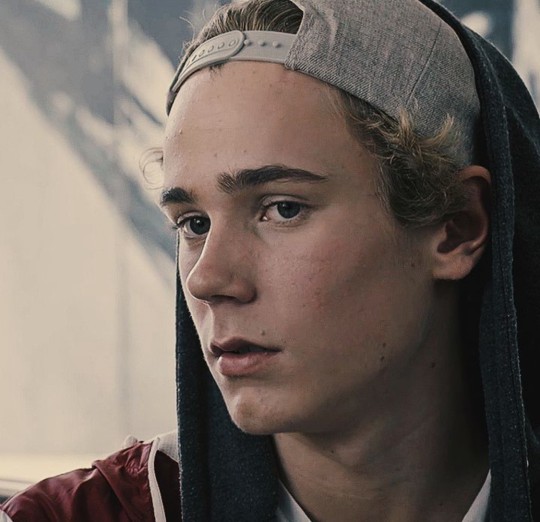
The 3rd season. I absolutely adored it. Isak and Even are definitely the best couple in the series. Their chemistry is off the charts. I absolutely loved every bit of them. As what what had made Skam famous, Isak is a homosexual. And Isak and Even are a homosexual couple. The story pretty much revolves around Isak’s coming out problems, Isak and Even’s relationship, and Even’s mental illness. I then started thinking. Isn’t Norway one of the most progressive countries when it comes to homosexuals? If so, then why is Isak having problems to come out? Well it seems that that stereotype doesn’t apply to every family living in progressive countries. You could have an accepting family and live in the Philippines (a country where homosexuality is merely tolerated, not so much accepted). And, you could live in Norway (a pioneer country in homosexual rights) and have a not-so-accepting family. And that’s exactly what happened to Isak.
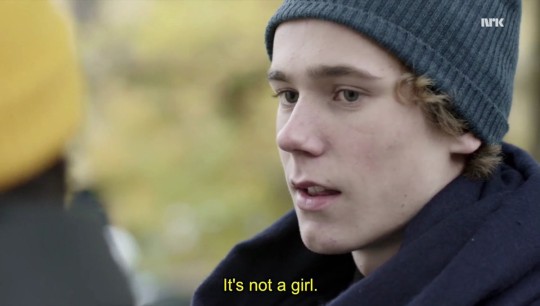
Isak has a die-hard Christian-Catholic mother who sends him bible passages everyday via SMS about how homosexuality is a sin and how they will burn in hell. His father is more accepting, but he isn’t that much close to him either, because of the fact that his father seperated with his mother and thus caused the whole family to collapse. And as such, he has problems coming out to his friends and his school, too. Because of his problems with his family, he thinks that people would distance themselves from him once he comes out, so he stays in the closet and pretends to be straight by hooking up with women.
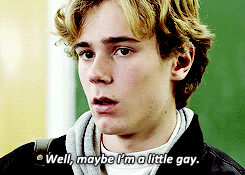
But that was not the case.
It was merely in his head; the fear of being rejected. I even laughed at the reaction of Jonas when Isak confessed to him that he was gay. He merely shrugged it off like it was normal. Well, it’s Norway after all, nothing unusual.
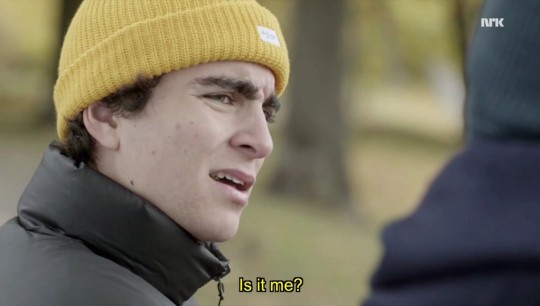
Now to the next topic. I won’t beat around the bush. Isak and Even ARE SO SWEET TOGETHER. They care for each other, they understand each other, they’re good for each other, and most of all, they love each other. And as the series progresses, they will find out more about each other — more about what they don’t want each other to find out — Isak having family problems and the fact that he hadn’t come out in school, yet; as well as the fact that he’s slowly becoming jealous of Even’s ex-girlfriend, and the fact that Even is bipolar.
But love… — this show thought me that if there’s one thing that could bypass anything — it’s love.
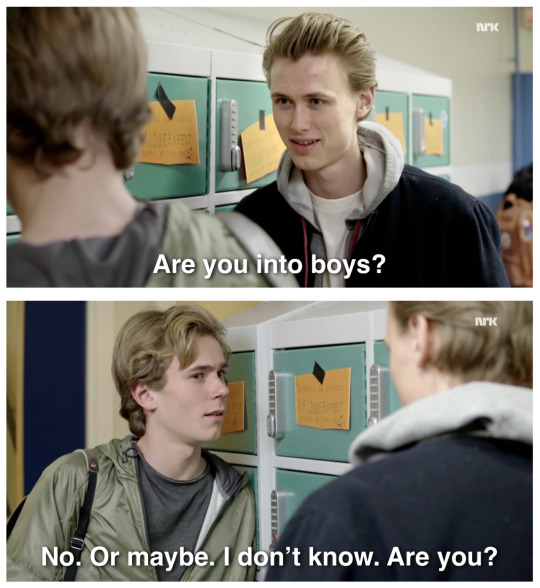
Isak and Even — Minute by minute…

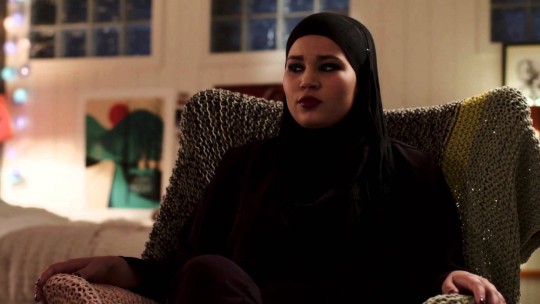
Last, but not the least…
Obviously. The popular muslim girl living in a 90% non-religious country. She is easily the best girl in the series. Tough, and doesn’t take without giving back. Like Noora, she’s tough only on the outside, but actually quite soft in the inside. When it comes to friends, family, or loved ones. I absolutely sympathized with her, too. Being a muslim is Norway is not tough. Like in many european countries, there’s a lot of prejudice on being a muslim, especially a muslim woman since they’re more visible because of the fact that most of them wear the Hijab and some of them wear the Niqab. Most western europeans see ‘that’ as them being forced to wear it, rather than a choice (the Niqab and Burqa are debatable, though).
“Tough.”

But soft. At the same time.
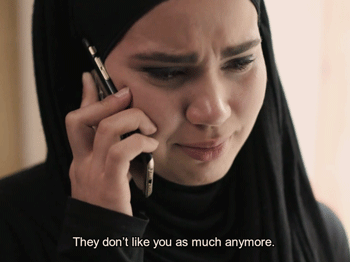
What I absolutely liked about her are three things:
1.) Dedicated and serious about her religion, but not to the point of extremism. She doesn’t take every word of the Qu‘ran literally (such as homosexuality), but instead takes the values in it. She also doesn’t let her religion affect her social life as she has many Norwegian friends — most of whom have a religion (and tastes — such as drinking alcohol and hooking up) vastly antithesis from hers.
2.) A real friend. And a friend that doesn’t judge. And a friend ready to defend you. She’s all three of that. She’s one of the best of friends you could have.
3.) She isn’t perfect. And that’s what makes me relate to her. The Sana that always burns those who offend her or her friends; the Sana that has perfect grades and want to be a medical doctor in the future; the Sana that has all the wise teachings and quotes for her friends — that’s just all a piece of her. But as we progress in the series, we can see a different Sana — an insecure one, a confused, tired, and heartbroken one.
“War doesn’t start with violence. It starts with misunderstandings and prejudice.” — Sana to Noora
And of course a season can’t be finished without love. I found Yousef’s and Sana’s love story a bit rushed, and it was definitely a weak point in the series. But they were definitely still really sweet with each other.
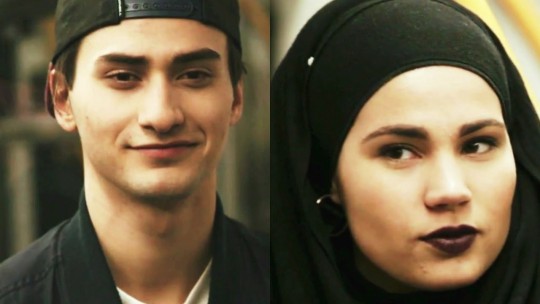
Lessons:
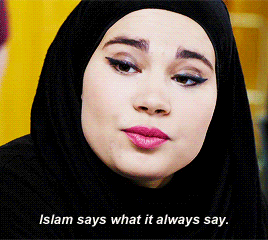
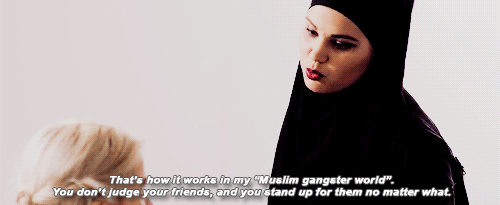

I absolutely admired how the five friends managed to still be friends by the end of the series. They managed to overcome tough times — but that’s what friends are for, are they not? They’re supposed to be there for you during tough times whether it involves them or not. And if there’s one thing this series absolutely thought me, it’s that friends matter. Real ones. A lot.




Least to say, the main characters weren’t the only one that provided lessons. The supporting characters were special, too.
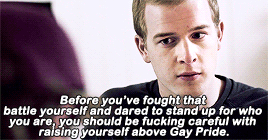
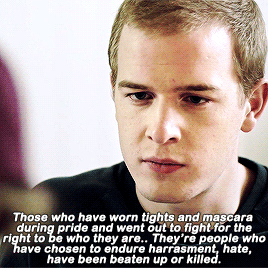
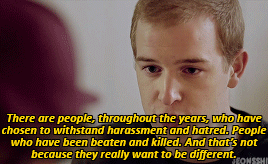

With Eskild about pride and that it’s not only about celebrating the present, but also the past and the future.
Or William with his obsession with Noora because he knows she loves him. And in the end, dedication truly does get what you want.
I learned a lot.
Not only experiences and funny moments. But also virtues and values that I may apply in real life.
Thank you, Skam — for opening not only my mind, but also my heart.
End.
#lgbtq#friendship#norway#skam#skamdaily#skam cast#skam season 3#skamedit#homo#pride#lonliness#feminism#muslim#islam#liberal
3 notes
·
View notes
Text
On Aziz Ansari: Let's Set the bar Higher than 'Not Rape'
I've had a hard time getting myself to sit down and write about this. I've procrastinated for days, always finding something else to do, other than think about this blogpost....or the Twitterhate writing about this subject could bring, from the antis and 'Rational Centrists' - who are usually...you know... *totally* believably moderate and Center in their politics. It's sad that we live in a world where being a feminist or simply a woman speaking up about sexual harassment/abuse/coercion/inappropriateness is a controversial position on the internet. Many tend to be more concerned about the careers of the accused being DESTROYED than what the victim might have gone through, and how their lives might have been affected. And, all this in a world where a self professed sexual predator was elected to lead one of the most powerful countries in the world.
His career seems fine, so far.
***
There are so many thoughts buzzing around in my head...things that I’m recalling, that I’d rather not. I'm reluctantly combing through my relevant memories, because these #MeToo stories cause them all to surface. Those experiences in uni, on a packed bus, at work...with a boss creepily running his finger down my neck, bare shoulder and along my ear... (was it my fault for wearing an off shoulder top?) are all coming back to me. Another experience comes to mind, one with a doctor responsible for putting me under before a surgery - who leaned in and called me 'sexy'...as I lay there on the operating table about to be knocked out cold. I clench my jaw just thinking about it. There are so many ways that behaviour can be sexually inappropriate, a whole spectrum exists. It's not always as black and white as rape vs. not rape, attack vs. no attack...it doesn't actually have to be an 'attack' to violate someone. And some very important, oft-neglected conversations lie in those grey areas. The thing that bothers me most about the discussion revolving around #MeToo, other than those trying to discredit the whole movement as some sort of hysterical, puritanical sex panic/witch hunt, is the binary thinking - That either this movement is perfection, impossibly unflawed....or that it is unfair and worth delegitimizing entirely... 'angry women' apparently now hold a lot of 'power' over some potentially innocent men that will get caught up in this. Will somebody please think of the accused men?!!
Sigh. If I were Aziz, I'd honestly cringe at the kinds of things being written in my defense.
(Click to enlarge) Interestingly. the writer of the above piece defending Aziz is also the author of this gem. "Having so many choices, Caitlin Flanagan maintains, has torn women away from what many of them want most: to raise a family and run a household. " I bet this is on Peterson's reading list.
The attempts to discredit a general conversation about sexual behaviour that crosses the line, takes me back to my experiences with conservative opinions in Saudi and Pakistan. While of course not at all comparable in the power they wield over dissenters or the degree of blatant misogyny...the underlying distaste for women having these conversations, reminds me of what I've seen in the other countries I've lived in. There are definitely some common themes, harder to ignore in these Trumpian times, as the better packaging comes undone. However, despite some fierce criticisms, a very important discussion has opened up. And I for one am pleased to see the walls of silence come crumbling down, inspiring women around the globe, including in my motherland, Pakistan. As difficult as these conversations are, they need to be had. Finally…finally, women are being heard on this. Finally the grey areas are up for discussion...
There's this ridiculous idea that if it’s not a Harvey Weinstein level of abuse then it’s basically not worth criticizing.
Firstly, I haven't seen anyone equate Aziz to Weinstein, and secondly why the fuck isn't something less than that worth talking about? The complaint isn't that it just wasn't romantic enough ffs.
I'd even say the behaviours and incidents that are not on the worse end of the spectrum are probably personally relevant to more people.
It might be hard to come to terms with for some -- especially those who are now having to question their own past actions -- but lets face it, sexual mores change, evolve and have *always* done so.
This isn't some new thing sprung upon us by the 'spoiled, shrill, unreasonable, sjw' feminists of this decade.
Once upon a time in popular media, Pepe le Pew's courting tactics were considered acceptable for children to view, hilarious even.
Now, we know better.
***
Many things can simultaneously be true in regard to this story & #MeToo, this is what most of the pushback doesn't get:
1) Of course it is in no way comparable to Weinstein, and 'Grace' from the story isn't saying that it is.
2) It still paints a concerning picture.
3) The Babe article was done irresponsibly, it's focus on irrelevant minute details like the wine, etc. were damaging to the story.
4) It still started an important conversation.
5) Just because it isn't rape or about workplace harassment, doesn't mean it can't be included in #MeToo.
6) Criticizing people who are less than serial rapists doesn't mean it's a witchhunt.
7) Yes there are bad takes happening in #MeToo, some blanketly throwing men under the bus. That is unavoidable in a conversation where literally anyone and everyone is chiming in. We should call those out too.
8) Some bad takes do not discredit all of #MeToo.
***
There are already many people like Christina Sommers, who will defend Milo at his worst,
Now deleted whataboutery deflecting from criticism of milo making comments about real ppl, actual consent. Not a play.
But are waiting to jump at the slightest chance to discredit this entire movement,
Not well reported but definitely not 'baseless', even he did not deny any of it.
The skeptosphere in particular has been painfully swamped with praise for the ‘brave women’ who speak out against #MeToo (because of course),
Not to mention this very article laid out that the 'brave woman' being praised also defended Roman Polanski. Then I was also linked to this, and it seemed he engaged and didn't deny defending someone who was jailed for paying underage sex workers. :(
There are takes involving the revolting hashtag #MeNeither (yes that's really a hashtag dedicated to people who haven't been sexually abused talking about flaunting how they haven't in the faces of those who have), that frankly strike me as reminiscent of women who insist that because *they* had a choice around the hijab and niqab, that those things are not oppressive. We have plenty such women in Pakistan and Saudi, so many of these systems would not have thrived so long without the help of women who have a case of internalized sexism. Their western counterparts are now more openly flaunting their positions, in this absurd Petersonian era of the Skeptosphere. I mean #TradLife is a meme that exists now and isn't laughed out of existence.
Yes yes unbunch your undies, I repeat, I know Saudi Arabia is worse and much more oppressive, and that women in Pakistan have a way tougher battle for rights ahead of them than western women do. I’ve heard that dismissing tactic enough times.
There can exist similarities with differing degrees of intensity.
But just imagine #MeNeither being used to oppose a hashtag where women were speaking up about religiously motivated abuse and mutilation like FGM. These same #MeNeither skeptics would see it for the disgusting minimization that it is.
Aside from all this, there are also the deeply disappointing 'maybe Sandusky [convicted serial child rapist] is innocent' takes by Jerry Coyne and in Skeptic magazine. Jerry also expressed sympathy for poor Milo after his whole pedophilia scandal.
Before I am accused of taking it 'out of context' let me just say here's a link to the whole piece read it and cringe for yourself.
The great Skeptic magazine also wrote a glowing review of Milo's book after this whole scandal.
There are endless examples of concerning attitudes on this subject among 'skeptics' (see Amos Yee & the number of people that stepped up to defend or minimize Sargon tweeting 'I wouldn't even rape you', those that applauded it at an atheist/skeptic conference) ...but that's a separate blogpost in itself.
Back to this story now;
This story hurt.
Aziz Ansari cuts deep, he’s a successful brown Muslim comedian…such success in hollywood is rare for brown people. I have been rooting for him from the start. I grew up longing to see faces like mine on TV...and now...there he was. Oh Aziz
:(
He’s a non traditional secular guy too who makes shows about his complicated relationship with his parents religious expectations, about the first time he snuck off with his cousin to have some pork.
There is so much that deeply and personally resonates with me. He's repping secular people of muslim background in a not anti-muslim way...which is just so rare and so important. It really hurts to see him criticized like this, and it hurts to read about how he conducted himself.
I don't criticize him lightly or easily, but even I can see that some criticism is warranted.
It also hurts because conservative muslims have already long attacked him with garbage takes like ‘hollywood only accepts secular muslims’
Really now. Hollywood only accepts secular Muslims?
....And now they're using this story to say that it was his secularism or westernization that are to blame. Which is such rubbish - as if traditional muslim men who have clung to their religiosity and culture do not mistreat women..as if men directly from the old country do not mistreat women.
I am so sick of people injecting their terrible agendas into #MeToo…be it anti-feminist, anti-western, anti-left, anti-porn, anti-casual sex....This isn't about any of those things...It's about sexual abuse and misconduct in whatever forms it may occur.
This isn't hard.
On the flip side of anti-secular I've also seen pathetic anti-Muslim takes.
Right, I suppose it was Cosby, Weinstein, Louis CK, Spacey & James Franco's Muslim upbringing that caused them to behave this way...I mean, obviously there are some religious hypocrites, sexually repressed who act out this way. But Aziz's story clearly isn't to do with his being of Muslim background. I forget which hadith says, 'demand a blowjob in the first 10 mins of a date'.
I’ve also seen embarrassing ex-muslim takes, bringing Mohammed, (the prophet) into this whole thing? I mean why… this conversation is about people that...at the very least, have recently existed?
Are we going to bring Henry VIII into it too? This is such foolishness, and such a stretch to find a way to drag Islam into it. Why do they insist on making Islam criticism so cringeworthy? Islam certainly has some terrible beliefs surrounding treatment of women, most Abrahamic religions do. But when you're grasping at straws like this and inserting mohammed into conversations like #MeToo , it just makes your criticism appear silly.
A better way would be to call out people who use religion/Islam to justify things like child marriage or sexual abuse today.. that would be relevant… unlike dragging Mo in all the way from 7th century Arabia.
As for the anti left takes... OH MAH GAWD THE HYSTERICAL LEFT IS ON A WITCHHUNT AGAIN *eyeroll*....Yes absolutely there are some extreme takes on the left that make me cringe. Just the other day I saw one with like 25K retweets saying that men should act like their name could be on a list. I don’t think that preemptively instilling fear in innocent people is the right lesson to take from this at all.
Then there was someone I encountered who claimed that STEM was immoral because Krauss tweeted that disappointing article. I mean, come on...what a ridiculous conclusion.
I’m happy to call those views out without dismissing the whole of #MeToo.
What I’m tired of seeing (particularly in the skeptosphere) are people who’ve not uttered a peep in support of women speaking out against predators but as soon as they get the opportunity to tweet an article questioning #MeToo, they’ll be all over that.
(click to enlarge) An screenshot from an actual article Michael Shermer tweeted out about #MeToo - apparently the voices of women who have had enjoyable sexual experiences are missing from #MeToo...well no shit.
***
Aziz’s case was a good way to see who’s just looking to delegitimize this entire conversation and who's willing to acknowledge the flaws in the Babe article... while also saying, "this is something we need to discuss, as we are currently redefining and renegotiating the boundaries of appropriate sexual behaviour. That is literally the point of this. Remember, at one time marital rape was not acknowledged...these boundaries continue to shift as culture shifts - and to be clear, I'm not saying this case was rape.
What makes Aziz’s case especially worthy of criticism is the context that he literally wrote a book on the nuances of modern dating,
"In Modern Romance, Ansari combines his irreverent humor with cutting-edge social science to give us an unforgettable tour of our new romantic world."
And let's remember that some of these cases have only surfaced because the women involved saw these men shamelessly flaunting a #TimesUp pin after having treated them in this way.
Aziz has often used feminism in his comedy, has talked about being a feminist and encouraged people to use the word. It's perfectly fair to call him on his unfeminist behaviour.
Some of what was detailed in that ‘Babe’ piece was pretty horrifying, I can't even believe this is up for debate or being characterized as her wanting him to be a 'mindreader'.
She physically removed her hand from his dick 5-7 times….she said she pulled away... went limp and stopped moving her mouth, she told him she didn’t want to feel forced…when he asked about sex she said 'next time'...
What about this is confusing or unclear? What part requires mindreading? What has made people behave so viciously towards Grace...the fact that it wasn't rape? Come on...is that where we are as a society? Our bar should be set well above 'not rape'.
He's a celebrity she has admired, it could easily have been intimidating for her when he started undressing her so immediately. She understandably needed a moment to process wtf was happening. She gave him enough cues to stop and he didn't...until she stood up and said no yet again. Even after all that he tried to kiss her again, reached to try and unbutton her pants again. Can a woman not expect to sit at a first-time date's house without getting felt up and kissed constantly?
He doesn’t seem to have denied any of the things she’s listed, just that it was interpreted differently by him. And he might be right, he may not have even noticed doing anything wrong...Which is what’s appalling, this is the conversation that hasn’t happened properly. Now is the time people are going to speak up about boundaries in the bedroom.
Some responses to this were so cruel, so vicious...it was hard to even look.
The victim blaming in relation to this case is just everywhere…the articles I’ve seen are unbelievable. How are we *still* having these discussions. Some of it perhaps, can be explained by a generational difference in perception. There's this idea that younger feminists are not tough enough, spoiled even. Feminists back in the day were fighting the 'real' fight, this is just shallow frivolous stuff now.
I mean of course there are some ridiculous fringe views in feminism too, but these are exaggerated to try and discredit the whole of it.
Being taken seriously when demanding progress has been a struggle for each generation.
Sarcasm Font:
Worry not, silly Regressives...everything is *great* now, feminism has achieved it's goals and therefore has become unnecessary - Because things are not *as* bad as they once were, because women are now seen as 'equal under the law'.... there's no problem. Kind of like how racism is over too. Especially post-Obama, there has been no racism in the US ever again. You know where they need feminism? In those other countries, those people over there don't know how to treat women. Us in the glorious West thankfully have it all worked out.
***
In seriousness though, one of the best responses I've seen to an accusation (not a perfectly comparable situation but one that is also 'not rape') is from Dan Harmon of the show Community who recorded a heartfelt apology on his podcast.
Here’s a weird one for you: Last week, I called out my former boss @danharmon for sexual harassment, and today I’m going to ask you to listen to his podcast. https://t.co/BEZAWH787V
— Megan Ganz (@meganganz) January 11, 2018
Now Grace’s critics might also look at this situation and see something that required no apology, but in my opinion his words did a lot of good. It set a great example for something like this to be done again.
Megan Ganz was a writer on the show that he had feelings for which soon became incredibly uncomfortable for her. Here are some quotes from his recorded apology below, which I think are especially significant in this climate. Too many people still insist that anything less than rape or Harvey Weinstein isn't worth discussing.
He made sure to tell his audience that attacking her or revictimizing her would do him no favours.
He used language like “Attracted to a writer I had power over”
“Ran the risk of undercutting her faith in her talent”
"I did the cowardly easiest laziest thing you could do with feelings like that, not dealing with them..and in not dealing with them I made everybody else deal with them. I made her deal with them. I was flirty, creepy, everything other than being overt enough to constitute betraying your live in girlfriend to whom you’re going home to every night."
He acknowledges, that he stopped short of doing anything obvious enough to constitute open betrayal and it was still a problem. And how everyone else, especially her…had to deal with that because he wouldn’t.
"….telling myself and anybody that threatened to confront me with it, that if you thought what I was doing was creepy or flirty or unprofessional, its because you were the sexist…”
Sounds familiar re: how the skeptosphere treats racism/sexism, It’s you who is the real sexist if you think women are victims. It’s you who is the real racist if you complain about racism.
(Interestingly it’s also like the twisted logic you hear a lot ex hijabis mention, how they once justified the modesty garment to themselves; "Women who don't wear hijabs are slaves to society/the patriarchy, who mould themselves according to the will of men." "Hijabs are liberating, feminist…a means of freeing yourself from the male gaze, from scrutiny over appearance, etc, if you don't wear one you are actually the oppressed one"… but no one really buys that kind of thinking deep down inside.. do they?)
Back to Dan Harmon though, note the subtlety he captures here:
"Its not as if this person didn’t repeatedly communicate to me the idea that what I was doing was divesting her of a recourse to integrity.. I just didn’t hear it. It didn’t profit me to hear it."
Aziz Ansari could benefit from thinking along these lines. What he did may have been within the bounds of legality…but it was most certainly not ok. As someone who is a celebrity you’ve got to be aware of the sway you have over others. He must have sensed some of her signals of not being on board...I mean she literally said at one point, "I don't want to feel forced" but it didn’t benefit him to really pick up on them and adjust his behaviour accordingly.
This line in particular struck me:
“I want it to sound relatively unremarkable to you because that’s the danger” - its really wonderful to hear someone acknowledge this...a man-person, even. There are so many of these 'unremarkable' experiences happening in bedrooms, at workplaces that cross the lines...we need to start talking about those, and how we've normalized this kind of thing.
"I wanted to teach her a lesson, if she didn’t like being liked in that way”
Good on him, for acknowledging he felt that way.
"I crushed on her and resented her for not reciprocating it, and the entire time I was the one writing her paycheques ….treated her cruelly. Things I would have never done if she was male."
"I lied to myself the entire time about it, I lost my job, I ruined my show and I damaged her internal compass…and I moved on." [emphasis mine]
I imagine this is an effect Aziz might have had on Grace as well, and it would be good of him to acknowledge it in the storm that is being unleashed on her. Her internal compass must be all over the place right now... second guessing herself for creating this cyclone of hate.
Yes we know Aziz isn't a monstrous rapist, but still this account does not paint him in a good light. It would be incredible to hear something like Dan Harmon's apology coming from him...something heartfelt, with no excuses. Something that calls out the articles and people hating on her. But that's usually not how things are handled in these situations, so I won't hold my breath. Harmon said he went against legal advice to talk about this openly.
Anyway, those are my meandering, rambly thoughts on the matter. Thanks for sticking around to read them.
I hope that we can soon stop shaming Grace, and have more productive conversations around sexual misconduct that is 'not rape'. I hope we can hold people to a higher standard in the bedroom than just 'but it wasn't illegal'. I hope that the terrible op-eds saying spare Aziz from criticism because he is brown-skinned will stop.
--------------
Thanks to my Patrons who make this work possible. If you enjoy my work please consider supporting here. With your help I can do so much more.
Shoutout to my newest Patrons: Andrew, Anthony, Gary, Fabio, Daniel, Ryan, Antonia, Bahman, Rodney, William, Jason, Maii & Larry.
Without you this isn't possible.
from Nice Mangos http://ift.tt/2rk6a5a via IFTTT
0 notes
Text
Selfies as self-presentation of women
In this post I am going to explain the importance of selfies in self-presentation of women in general. I am going to firstly define what a selfie is and the way in which people can portray themselves in different ways. I will then outline the way in which social networks allows for the understanding of what beauty is to women and how they portray that through sharing photos with others. I am going to use Goffman’s theory of self-presentation to explain how individuals compare themselves with others and try to create a positive image. Beauty apps that have been introduced also allows women to show their edited beauty online. Finally, I will explain how post-feminists take control of their own bodies. Selfies influence the way in which women understand themselves and get to know their own bodies well
A selfie is thus understood as a picture an individual takes of him/herself (Tifentale and Manovich, 2015; Frosh, 2015). It can also be defined as a self-portrait taken with a webcam or smartphone and disseminated on Social Network Sites(SNS) (Iqani and Schroeder, 2016). Selfies are usually taken at an arm’s stretch or with a selfie-stick, documenting moments that the user want to remember (Hess, 2015). Frosh (2015, 1611) explains the selfie as “the culmination and also the incarnation of a gesture of mediation”. They often claim attention and requires immediate gaze, which may also serve as a visual diary to some (Iqani and Schroeder, 2016). ‘Publicised privacy’ explains how the private environment is now being shown to the world through a selfie, therefore representing oneself the way they want. Selfies are a form of self-expression where there are no boundaries between the private and public moments, because its creators share on social media (Hess, 2015).
Selfies are shared mostly by young people on SNS, this shows their commonality within this space. Any individual who has a smartphone and connected to social media is thus able to post their selfies online. Twitter, Instagram, Tumblr and Facebook facilitate in the distribution of selfies (Murray, 2015; Tifentale and Manovich, 2015) with other people regardless of demography (Frosh, 2015). Before smartphones, other people were the ones taking pictures of people using cameras, but now the nature of the media have been changed and individuals have the power to control how their pictures comes about. The front-camera function on smartphones give its users more flexibility of sharing ‘selfies’ in a media which has commodified ‘selfies (Mascheroni et al, 2015). It can also be seen how social networks have largely facilitated in the understanding of young girls idealized view of beauty (Chua and Chang, 2016). This is a platform where people learn how to conform to the standards of beauty and thus self-presentation become the central point of influences from one’s mates. In a study done by Chua and Chang (2016) of 12-14 years secondary school girls in Singapore and their usage of posting their selfies on Instagram. It is evident that they judge themselves based on how their peers look and the kind of images they post on Instagram. They equated likes with being appreciated by their peers and to show its importance, one girl highlighted that she was using an app that generates likes (Chua and Chang, 2016). In this way self-presentation becomes important for an individual.
Goffman’s theory of self-presentation explains how an individual will construct their behaviour or themselves based on how they want others to see them by trying to make a good perception (Mascheroni et al, 2015). Selfies are being used as a symbol of free will and overseeing oneself. Thus, people in social interactions engage with one another to understand the other individual. Self-presentation allows people to present themselves the way they wold like to be seen by other people. People self-evaluate themselves by judging against their peers and what they see on the media as the perceived ideal beauty females should adapt to (Chua and Chang, 2016). Being accepted by one’s peers seems to play a very vital role in the way they present themselves as their offline lives also say something about who they are or aspire to be like (Mascheroni et al, 2015). This shows that the society we live in, especially the SNS facilitate in how we understand beauty and how one may turn into being dissatisfied with the way they look (Chua and Chang, 2016). At times girls they fear being marginalised as thus they conform to the beauty standards being set by the media, and posting their best pictures online. Hence in most cases when they are accepted their self-esteem improves (Seidman, 2013).
Creating a good image to the public seems like a priority to young teenage girls and needing validation from other people as to whether they are pretty or not (Chua and Chang, 2016). Through sharing selfies and finding a sense of belonging within the digital space allows for women to appreciate themselves even more (Tiidenberg and Gómez Cruz, 2015). Sharing selfies on SNS also paves way for one to experiment with their bodies, or rather to re-create their body-image and to show the world that there are different ways of being oneself. An individual is more likely to get more followers when they disclose more about them and they are mostly the ones who are in control of their own bodies and posts (Tiidenberg and Gómez Cruz, 2015). The unattainable images of what beauty is, have led to more girls creating blogs where they display themselves as a way for the public to accept them as they are. Creating a positive body outlook and not the one imposed by the media on them, and used to increase the notion of femininity (Murray, 2015). This is a platform where people feel belongingness and create self-presentation based on how they are being received by their peers and most importantly allowing others to learn more about their lives (Seidman, 2013; Gabriel, 2014). Sharing selfies allows for the construction of identities and belonging to the SNS community (Tifentale and Manovich, 2015). Beauty apps have allowed young women to present themselves in an idealised manner, and that the media facilitates in the perception of beauty.
These photo-editing software’s allow one to look perfect and eliminate any blemishes on the skin, make an individuals skin to look clearer and use some effects on the picture thus getting the flawless view of themselves (Rettberg, 2014). Edited photos seem to enhance the confidence of people with low self-esteem on Instagram and Facebook (Chua and Chang, 2016). Selfies present the idea of ‘authenticity’, even though they are staged performances where one must look for the perfect angle, framing, clothing, background or lighting to take out the best selfie or present ourselves in certain way (Hess, 2015). One of the apps that distort our visual representation is an app called ‘SkinneePix’ which makes people look skinnier than they are and allowing people shape how they are seen online (Rettberg, 2014). Snapchat allows women to appear in a playful interaction, thus eliminating the ‘perfect’ connotation by the media culture (Iqani and Schroeder, 2016). While some women may strive always to conform to the standards many, reject those standards and try to create their own (Mascheroni et al, 2015).
Post-feminism can be understood as the notion of representation, in relation to how women have taken control over their bodies and changed the public perception of them (Murray, 2015). Another platform which has allowed for the power and control elicited by women through taking selfies is NSFW (Not Safe For Work) Tumblr blogs (Tiidenberg and Gómez Cruz, 2015). Women post sexy selfies as a way of owning their bodies and creating the body-image that best suits them unlike when they are being photographed by other people. Popular culture has always shown us the images of ‘slim’ girls which supposedly all women should imitate. But by these Tumblr blogs, women reclaim their own bodies by showing an understanding of who they are, refusing to abide by the social standards of beauty (Tiidenberg and Gómez Cruz, 2015). This allows for women of all body shapes or sizes to share their selfies knowing very well that there are no boundaries, and thus building their esteem of appreciating themselves as they are.
When women own their bodies, it allows the public to accept them and change their views on what they think is photographable or appealing to them (Tiidenberg and Gómez Cruz, 2015). Selfies is a way of women to be in control of their bodies, even in a sexual way but not made for the male gaze. It highlights women controlling their own space and taking pictures the way they want without being subjected by the male-dominated media culture’s fascination over them (Murray, 2015). They are also a way for women to reclaim power in their own space and control how their identity gets shaped in this space (Tiidenberg and Gómez Cruz, 2015). The hijab selfie also trended as a way for Muslim women to make people accept them without oppressing them when they choose to wear their niqab or hijab (Iqani and Schroeder, 2016). They are reclaiming the space and their headscarf to alert the public that they are proud of it and not ashamed to be Muslim women. It is a form of self-expression that is at the present, and created to be shared to other people.
A selfie is a picture taken by a person, at an arm’s lengths and using a smartphone, they are usually disseminated by young people. This draw attention to how SNS have become a form of self-expression that young people use to communicate with their peers. Goffman’s theory of self-presentation also talks about how peer-comparison influences a person. Self-presentation is important to most women, hence the NSFW (Not Safe For Work) Tumblr blogs allows women to have control over their own bodies. Another example is of Muslim women reclaiming their identity in a space where they are oppressed because of their headscarf’s and people’s perception of how Muslim women are like. Post feminism is evident in this digital age where power and control lie in the hands of women and not in the media.
Bibliography
Chua, T.H.H. and Chang, L., 2016. Follow me and like my beautiful selfies: Singapore teenage girls’ engagement in self-presentation and peer comparison on social media. Computers in Human Behavior, 55, pp.190-197.
Frosh, P., 2015. Selfies| The gestural image: The selfie, photography theory, and kinesthetic sociability. International journal of communication, 9, p.22.
Gabriel, F., 2014. Sexting, selfies and self-harm: young people, social media and the performance of self-development. Media International Australia, 151(1), pp.104-112.
Hess, A., 2015. Selfies| The selfie assemblage. International journal of communication, 9, p.18.
Iqani, M. and Schroeder, J.E., 2016. # selfie: digital self-portraits as commodity form and consumption practice. Consumption Markets & Culture, 19(5), pp.405-415.
Mascheroni, G., Vincent, J. and Jimenez, E., 2015. “Girls are addicted to likes so they post semi-naked selfies”: Peer mediation, normativity and the construction of identity online. Cyberpsychology: Journal of Psychosocial Research on Cyberspace, 9(1).
Murray, D.C., 2015. Notes to self: the visual culture of selfies in the age of social media. Consumption Markets & Culture, 18(6), pp.490-516.
Rettberg, J.W., 2014. Seeing ourselves through technology: How we use selfies, blogs and wearable devices to see and shape ourselves.
Seidman, G., 2013. Self-presentation and belonging on Facebook: How personality influences social media use and motivations. Personality and Individual Differences, 54(3), pp.402-407.
Tiidenberg, K. and Gómez Cruz, E., 2015. Selfies, image and the re-making of the body. Body & society, 21(4), pp.77-102.
Tifentale, A. and Manovich, L., 2015. Selfiecity: Exploring photography and self-fashioning in social media. In Postdigital Aesthetics (pp. 109-122). Palgrave Macmillan UK.
0 notes